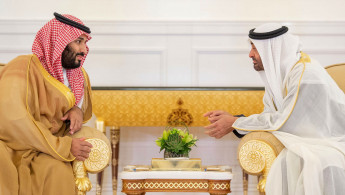Saudi Arabia, UAE yet to pay Yemen aid pledges: UN
The UN called out Saudi Arabia and the United Arab Emirates on Thursday for failing to pay the full $750 million pledged during a humanitarian appeal for Yemen five months ago.
UN aid chief Mark Lowcock said the two countries have only paid a “modest proportion” of the hundreds of millions of dollars pledged at a UN fundraising event in February.
Of the $750 million, Saudi Arabia has so far only paid $121.7 million and the United Arab Emirates about $195 million, according to UN figures.
Saudi Arabia and the UAE are both leading countries in a military coalition that was formed to fight Houthi rebels in Yemen and reinstate the internationally recognised government of Abedrabbo Mansour Hadi.
The controversial coalition has been blamed for more than half of Yemen’s death toll, which exacerbated when it intervened in March 2015.
“Those who made the largest pledges – Yemen’s neighbours in the coalition - have so far paid only a modest proportion of what they promised,” Lowcock told the UN Security Council, noting that as a result the UN appeal was only 34 percent funded compared with 60 percent at this time last year, according to a Reuters report.
Saudi Arabia’s UN ambassador responded by saying Riyadh had paid more than $400 million to the United Nations and other aid organisations this year.
“This year we alone ... we have paid more money into Yemen than any of the donors in the world,” Abdallah Al-Mouallimi told reporters.
The UAE’s mission to the United Nations said the Gulf state is “currently working with the UN on the modalities of the 2019 commitment to ensure maximum benefits for the Yemeni people.”
The UAE said it had allegedly given $5.5 billion in aid to Yemen since April 2015.
Meanwhile, the United States, which sells billions of dollars worth of weapons and military equipment to Saudi Arabia and United Arab Emirates, said it has paid more than $288.7 million to the UN Yemen appeal, making it the largest donor for 2019
“We join the call today for all donors to step up assistance in Yemen, and to fulfill their financial commitments,” senior US diplomat Rodney Hunter told the Security Council.
The war has killed thousands of people and has created what the UN calls the world's worst humanitarian crisis. Millions have fled their homes, and the UN has said 80 percent of Yemen's population - more than 24 million people - need aid, including 10 million who rely on food aid.
Saudi-led airstrikes have hit schools, hospitals and wedding parties and killed thousands of Yemeni civilians.
The Houthi rebels, meanwhile, have used drones and missiles to attack the neighbouring Saudi kingdom in response to what it describes as Saudi aggression in Yemen.
Progress on the ground
On Thursday, the UN food agency said it reached an "agreement in principle" to restore full food aid to rebel-controlled parts of war-torn Yemen after suspending the aid last month.
World Food Program Executive Director David Beasley told the Security Council he got word of the as-yet-unsigned agreement even as he spoke to the group at a previous meeting. He didn't detail provisions of the potential pact, and a UN spokesman gave no further details when asked at a media briefing shortly afterward.
"A lot of progress has been made," Beasley told the council. "... But we've got to find a final solution. I believe we'll get there."
If the agreement is inked, the WFP is ready to get food back to Yemen's capital, Sanaa, "within days" of the signing, Beasley said.
The partial suspension of aid to Sanaa began late last month amid accusations the rebels were diverting the food from the hungriest people in the Arab world's poorest country, which has been pushed to the brink of starvation.
The suspension affects 850,000 people in Sanaa, where the WFP says the bulk of the looting takes place. The rebels, known as Houthis, denied the accusation. They have controlled the capital since 2014.
"Not a day has gone by where I have not thought of the impact that suspending food assistance may have," Beasley said, apologising to people in Sanaa and throughout Yemen for their ordeal.
The Houthis responded to the suspension by accusing the WFP of sending spoiled food.
The agency said some of the food held for long in areas controlled by the rebels had indeed gone bad.
Despite the suspension, Beasley told the council that WFP has in the last month increased the overall number of Yemenis it has helped, from 10.6 million to 11.3 million.
Follow us on Twitter: @The_NewArab





 Follow the Middle East's top stories in English at The New Arab on Google News
Follow the Middle East's top stories in English at The New Arab on Google News
![The UAE is widely suspected of arming the RSF militia [Getty]](/sites/default/files/styles/image_330x185/public/2024-11/GettyImages-472529908.jpg?h=69f2b9d0&itok=Yauw3YTG)
![Netanyahu furiously denounced the ICC [Getty]](/sites/default/files/styles/image_330x185/public/2024-11/GettyImages-2169352575.jpg?h=199d8c1f&itok=-vRiruf5)
![Both Hamas and the Palestinian Authority welcomed the ICC arrest warrants [Getty]](/sites/default/files/styles/image_330x185/public/2024-11/GettyImages-2178351173.jpg?h=199d8c1f&itok=TV858iVg)